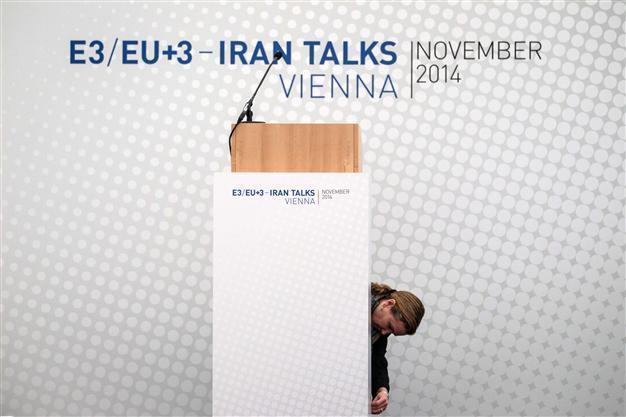Kerry to join troubled nuclear talks as Iran refuses to give ground on key Arak reactor
TEHRAN - Agence France-Presse

A woman works at a speaker's desk in a media center near Palais Coburg where closed-door nuclear talks with Iran take place in Vienna on Nov. 20. AFP Photo
U.S. Secretary of State John Kerry will join troubled nuclear talks in Vienna later Nov. 20, as Tehran showed no sign of softening its position days before a deadline for a deal.The announcement of Kerry's trip came a day after his counterpart from Britain, one of six powers negotiating with Iran ahead of the cut-off point on Nov. 24, expressed pessimism that the mammoth accord could be done in time.
"I am not optimistic that we can get everything done by Monday," British Foreign Secretary Philip Hammond said in Latvia.
The best to be hoped for, he indicated, was another extension, but only if there is "significant movement."
A U.S. State Department spokesman however insisted that negotiators were "still focused" on getting a deal done in time - something that many experts doubt, particularly as an earlier July 20 deadline was missed.
Iran and the five permanent members of the U.N. Security Council plus Germany have been negotiating since February to turn an interim accord with Iran reached a year ago into a lasting agreement before November 24.
Such a deal, after 12 years of rising tensions, is aimed at easing fears that Tehran will develop nuclear weapons under the guise of its civilian activities - an ambition the Islamic republic has always denied.
Some areas appear provisionally settled in what would be a highly complex deal that would run for many years, even decades.
But two key issues remain: enrichment - rendering uranium suitable for peaceful uses but also, at high purities, for a weapon - and the pace of the lifting of sanctions on Iran under a deal.
Iran's nuclear chief on Nov. 20 ruled out further negotiations on the design of a reactor that the West fears could be used to produce plutonium for an atomic bomb.
The future of the Arak reactor is one of the main issues in talks between Iran and six world powers under way in Vienna. Iran insists the unfinished reactor, located 240 kilometers southwest of Tehran, is solely for research purposes.
It has already promised to make some modifications to the design of the heavy water reactor to limit plutonium output.
The United States has proposed transforming Arak into a light water reactor so that it produces far less plutonium, but Tehran has refused.
"On Arak, we have said we were ready to design it so that the concerns are lifted. This matter is settled to some extent on the technical aspect and there is no more room for further negotiations," Ali Akbar Salehi was quoted by local media as saying.
Iranian officials have said the design of the Arak reactor - whose construction is being supervised by the U.N. nuclear watchdog - will be modified to produce one kilogramme (2.2 pounds) of plutonium a year instead of eight kilos as originally planned.
Salehi reaffirmed Iran's position that its uranium enrichment capacity must be 190,000 SWU (Separative Work Units) - equivalent to 190,000 first-generation centrifuges - close to 20 times its current processing ability.
The West wants a drastic reduction in the number of centrifuges.
"We need output of at least 190,000 SWU within the next eight years" to provide fuel for a power plant in the southern Gulf port city of Bushehr, and for a research reactor in Tehran, Salehi said.
Earlier this month, Russia signed a contract with Iran to build two new reactors at the Russian-built Bushehr plant.
There is also the possibility of Moscow transferring some sensitive technology relating to the production of fuel rod components.
Salehi, who heads the Atomic Energy Organisation of Iran, also dismissed the idea of moving fuel manufactured in Iran abroad. "It makes no sense to make so much effort here to produce fuel and then send it overseas to be stored," he said.
He also said Iran would refuse a "special" inspection system for its nuclear sites. The West wants increased surveillance of the sites by the International Atomic Energy Agency, the U.N. watchdog, to ensure there is no illegal activity.
















